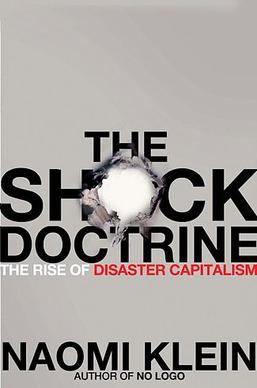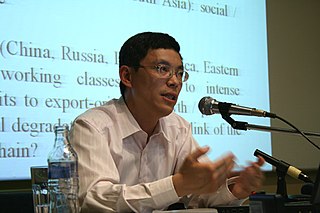Crony capitalism, sometimes called cronyism, is an economic system in which businesses thrive not as a result of free enterprise, but rather as a return on money amassed through collusion between a business class and the political class. This is often achieved by the manipulation of relationships with state power by business interests rather than unfettered competition in obtaining permits, government grants, tax breaks, or other forms of state intervention over resources where business interests exercise undue influence over the state's deployment of public goods, for example, mining concessions for primary commodities or contracts for public works. Money is then made not merely by making a profit in the market, but through profiteering by rent seeking using this monopoly or oligopoly. Entrepreneurship and innovative practices which seek to reward risk are stifled since the value-added is little by crony businesses, as hardly anything of significant value is created by them, with transactions taking the form of trading. Crony capitalism spills over into the government, the politics, and the media, when this nexus distorts the economy and affects society to an extent it corrupts public-serving economic, political, and social ideals.

Capitalism is an economic system based on the private ownership of the means of production and their operation for profit. Central characteristics of capitalism include capital accumulation, competitive markets, price system, private property, property rights recognition, voluntary exchange, and wage labor. In a market economy, decision-making and investments are determined by owners of wealth, property, or ability to maneuver capital or production ability in capital and financial markets—whereas prices and the distribution of goods and services are mainly determined by competition in goods and services markets.
In economics, a free market is an economic system in which the prices of goods and services are determined by supply and demand expressed by sellers and buyers. Such markets, as modeled, operate without the intervention of government or any other external authority. Proponents of the free market as a normative ideal contrast it with a regulated market, in which a government intervenes in supply and demand by means of various methods such as taxes or regulations. In an idealized free market economy, prices for goods and services are set solely by the bids and offers of the participants.

A market economy is an economic system in which the decisions regarding investment, production and distribution to the consumers are guided by the price signals created by the forces of supply and demand. The major characteristic of a market economy is the existence of factor markets that play a dominant role in the allocation of capital and the factors of production.

Bryan Douglas Caplan is an American economist and author. Caplan is a professor of economics at George Mason University, research fellow at the Mercatus Center, adjunct scholar at the Cato Institute, and former contributor to the Freakonomics blog and EconLog. He currently publishes his own blog, Bet on It. Caplan is a self-described "economic libertarian". The bulk of Caplan's academic work is in behavioral economics and public economics, especially public choice theory.
Rent-seeking is the act of growing one's existing wealth by manipulating the social or political environment without creating new wealth. Rent-seeking activities have negative effects on the rest of society. They result in reduced economic efficiency through misallocation of resources, reduced wealth creation, lost government revenue, heightened income inequality, risk of growing political bribery, and potential national decline.
A theory of capitalism describes the essential features of capitalism and how it functions. The history of various such theories is the subject of this article.

Tyler Cowen is an American economist, columnist and blogger. He is a professor at George Mason University, where he holds the Holbert L. Harris chair in the economics department. He hosts the economics blog Marginal Revolution, together with co-author Alex Tabarrok. Cowen and Tabarrok also maintain the website Marginal Revolution University, a venture in online education.

Criticism of capitalism ranges from expressing disagreement with the principles of capitalism in its entirety to expressing disagreement with particular outcomes of capitalism.

Raghuram Govind Rajan is an Indian economist and the Katherine Dusak Miller Distinguished Service Professor of Finance at the University of Chicago Booth School of Business. Between 2003 and 2006 he was Chief Economist and director of research at the International Monetary Fund. From September 2013 through September 2016 he was the 23rd Governor of the Reserve Bank of India.

Saving Capitalism from the Capitalists: Unleashing the Power of Financial Markets to Create Wealth and Spread Opportunity is a non-fiction book by Raghuram Rajan and Luigi Zingales of the University of Chicago Booth School of Business. It was published in hardcover in 2003 by Crown Business (ISBN 0-609-61070-8) and released in softcover by Princeton University Press in 2004 (ISBN 0-691-12128-1).

Per Anders Åslund is a Swedish economist and former Senior Fellow at the Atlantic Council. He is also a chairman of the International Advisory Council at the Center for Social and Economic Research (CASE).
Stephen Alan Marglin is an American economist. He is the Walter S. Barker Professor of Economics at Harvard University, a fellow of the Econometric Society, and a founding member of the World Economics Association.
Cultural economics is the branch of economics that studies the relation of culture to economic outcomes. Here, 'culture' is defined by shared beliefs and preferences of respective groups. Programmatic issues include whether and how much culture matters as to economic outcomes and what its relation is to institutions. As a growing field in behavioral economics, the role of culture in economic behavior is increasingly being demonstrated to cause significant differentials in decision-making and the management and valuation of assets.

The Shock Doctrine: The Rise of Disaster Capitalism is a 2007 book by the Canadian author and social activist Naomi Klein. In the book, Klein argues that neoliberal free market policies have risen to prominence in some developed countries because of a deliberate strategy of "shock therapy". This centers on the exploitation of national crises to establish controversial and questionable policies, while citizens are too distracted to engage and develop an adequate response, and resist effectively. The book advances the idea that some man-made events, such as the Iraq War, were undertaken with the intention of pushing through such unpopular policies in their wake.

Li Minqi is a Chinese political economist, world-systems analyst, and historical social scientist, currently professor of Economics at the University of Utah. Li is known as an advocate of the Chinese New Left and as a Marxian economist.

Luigi Zingales is a finance professor at the University of Chicago Booth School of Business and the author of two widely-reviewed books. His book Saving Capitalism from the Capitalists (2003) is a study of "relationship capitalism". In A Capitalism for the People: Recapturing the Lost Genius of American Prosperity (2012), Zingales "suggests that channeling populist anger can reinvigorate the power of competition and reverse the movement toward a 'crony system'."
Throughout modern history, a variety of perspectives on capitalism have evolved based on different schools of thought.
Paola Sapienza is an American and Italian economist. She is a member of the Kellogg School of Management faculty at Northwestern University.











